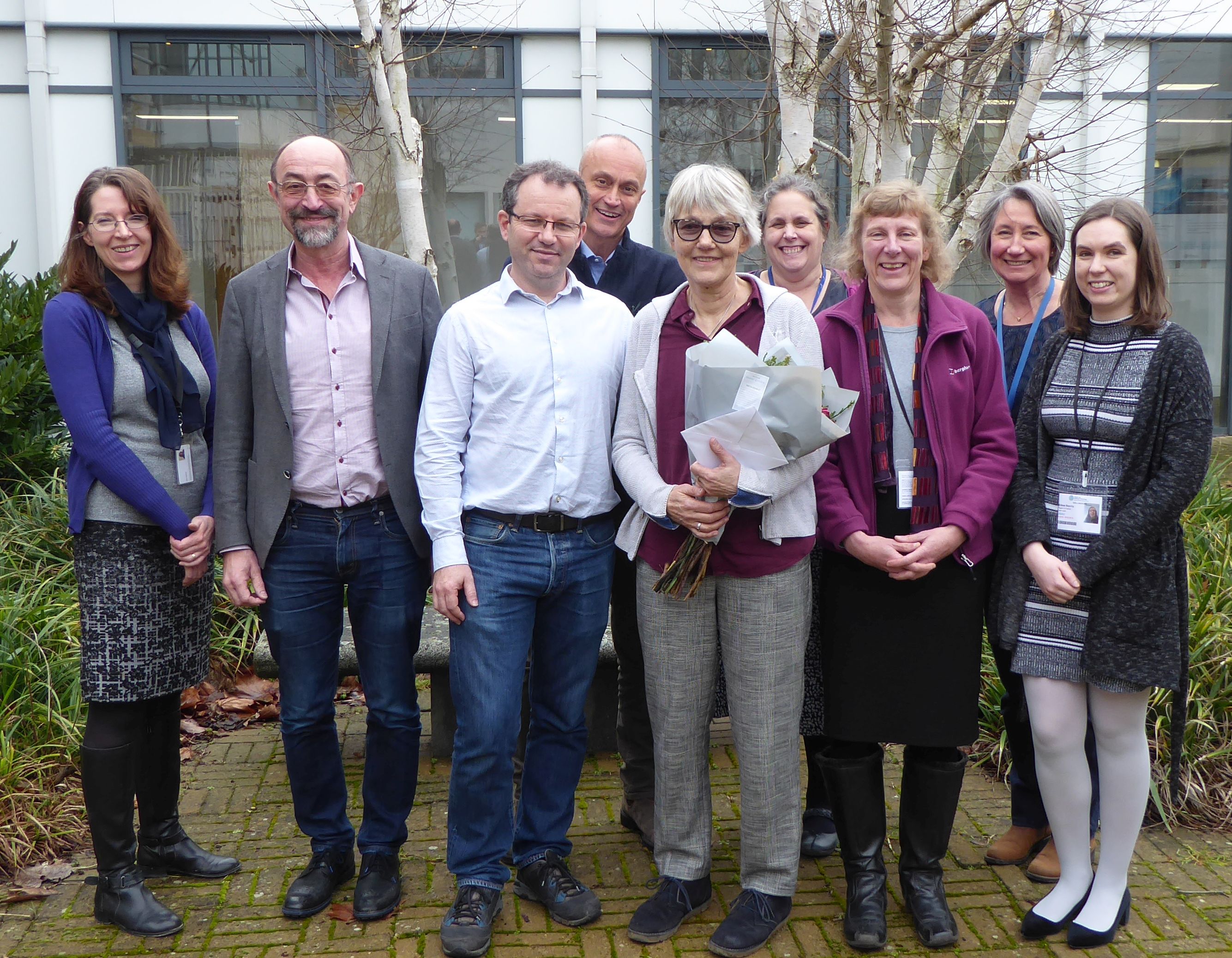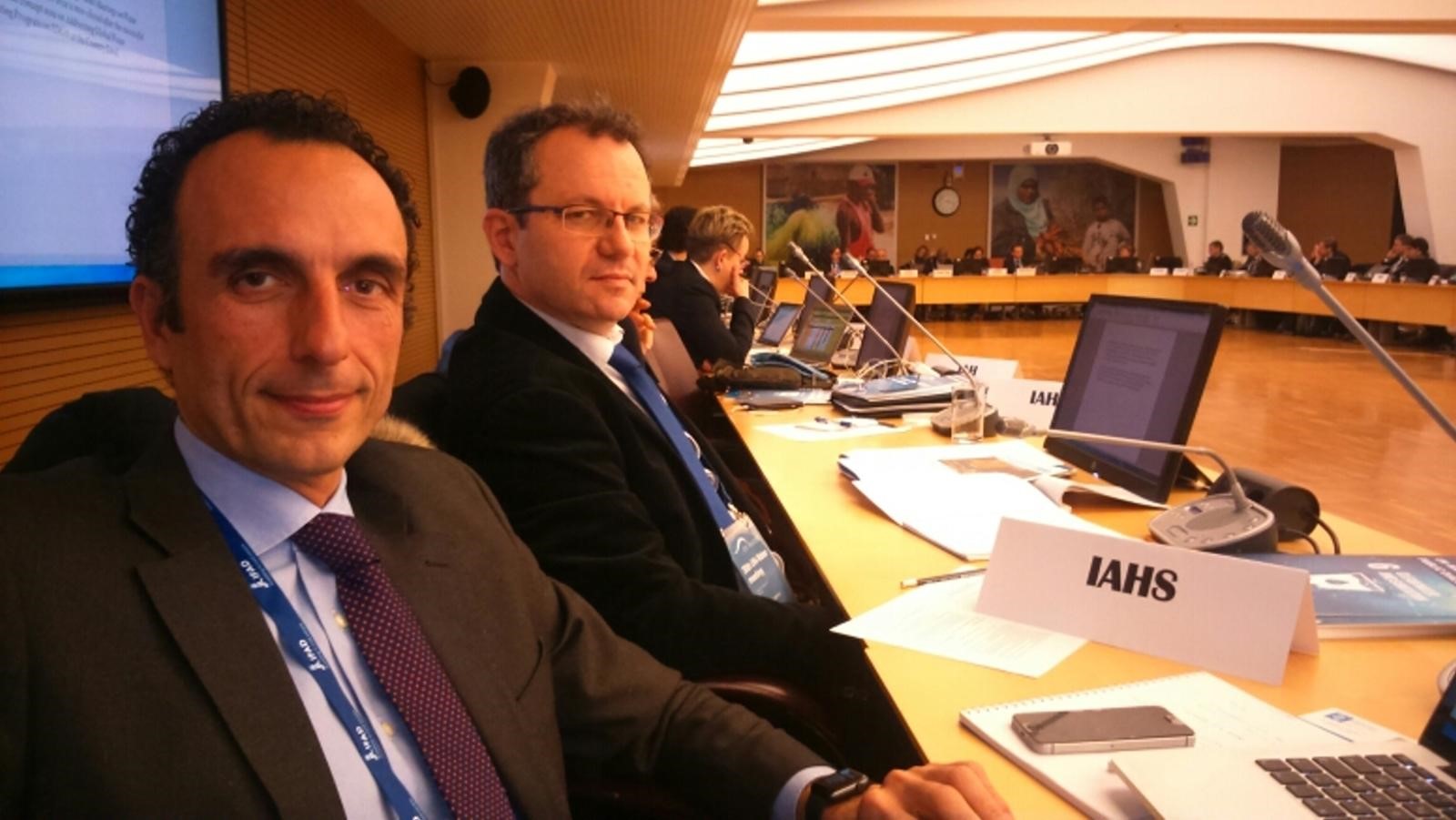IAHS News
IUGG’s Centennial Anniversary

Formed in Brussels, Belgium, on 28 July 1919, the International Union of Geodesy and Geophysics (IUGG) celebrates its 100th anniversary in 2019. The centennial year marks an important milestone for IUGG. Since its inception as a union of international scientific associations, IUGG has evolved into a prominent scientific organization promoting Earth and space sciences worldwide in the complex political, economic and scientific landscapes of the 20th and the beginning of the 21st centuries. IUGG’s mission is to advance, strengthen and promote Earth and space sciences for the benefit of humanity through international research cooperation and education, and to communicate the knowledge to governments and policymakers. For the decades ahead, IUGG envisions a future Earth that is environmentally sustainable and where societies are resilient against natural hazards. We celebrate the IUGG centennial not only to remind geoscientists how important international scientific cooperation is and how IUGG science and science diplomacy have developed over the last century, but also to think collectively about future scientific developments, international scientific initiatives, and finding solutions to the urgent problems of our society, especially to those related to the 2030 UN Agenda for Sustainable Development. We are looking at the past in order to develop a new future for Earth and space sciences and to promote science for the benefit of all.
To celebrate the Centennial of the Union, IUGG established a Task Force to develop a program for celebrations around the world for 2018-2019. In 2018, several conferences/symposia and a summer school for early career scientists were held in China, Japan, Mexico, Turkey, and the USA. The program for this year includes:
- 27th IUGG General Assembly, Montreal, Canada, 8-18 July 2019;
- Celebration of the IUGG Centennial at UNESCO, Paris, France, 29 July 2019;
- Several meetings in Europe, South America, and the Middle East;
- A special volume on “The International Union of Geodesy and Geophysics: From Different Spheres to a Common Globe” will be published as a part of the peer-reviewed journal History of Geo- and Space Sciences.
As a part of this program, a website dedicated to the IUGG Centennial has been developed and is now open to the public. Please visit http://100.iugg.org/ to learn more about the history of IUGG. We hope all visitors to the website, especially IUGG scientists from all nations and geoscientific disciplines, will enjoy this wonderful 100-year journey through space and time and appreciate the work of several generations of Earth and space scientists, who voluntarily contributed their time and efforts to the development of international cooperation in geosciences.
Michael G. Sideris, IUGG President
Alik Ismail-Zadeh, IUGG Secretary-General
IUGG GA Abstract submission and Travel Grant Submission closes on Friday this week
 Deadline for Abstract submission and Travel Grants has been extended to March 1, 2019 at 12:00 Central European Time (CET). The extension is to accommodate many researchers, who have been affected by technical difficulties, and national governmental regulations.
Deadline for Abstract submission and Travel Grants has been extended to March 1, 2019 at 12:00 Central European Time (CET). The extension is to accommodate many researchers, who have been affected by technical difficulties, and national governmental regulations.
The IAHS programme will be over the first half of the Assembly ie 9-14 July 2019.
Abstracts must be submitted via the online submission system.
To submit an application for a travel grant to attend IUGG2019, please click here.
Conference Registration and Visa Application
Early-bird registration deadline: April 5, 2019
Please note that, if you need a visa to enter Canada, the necessary letter of invitation will be generated when registration and payment are complete. We therefore encourage delegates to register as early as possible in order to start their visa application process.
For the full program overview and symposia details: http://iugg2019montreal.com/iugg-program.html
For additional information, please contact [email protected]
Deadline for Abstract submission and Travel Grants extended to March 1, 2019

Deadline for Abstract submission and Travel Grants has been extended to March 1, 2019 at 12:00 Central European Time (CET). The extension is to accommodate many researchers, who have been affected by technical difficulties, and national governmental regulations.
The IAHS programme will be over the first half of the Assembly ie 9-14 July 2019.
Abstracts must be submitted via the online submission system.
To submit an application for a travel grant to attend IUGG2019, please click here.
Conference Registration and Visa Application
Early-bird registration deadline: April 5, 2019
Please note that, if you need a visa to enter Canada, the necessary letter of invitation will be generated when registration and payment are complete. We therefore encourage delegates to register as early as possible in order to start their visa application process.
For the full program overview and symposia details: http://iugg2019montreal.com/iugg-program.html
For additional information, please contact [email protected]
5 days left for abstracts submission and travel grant!

The IAHS programme will be over the first half of the Assembly ie 9-14 July 2019.
Abstracts submission deadline – 5 days left!
Abstracts must be submitted via the online submission system.
The deadline is on February 18, 2019, 23:59 (or 11:59 PM) Pacific Time.
Travel grant deadline – 5 days left!
To submit an application for a travel grant to attend IUGG2019, please click here.
Deadline to submit a travel grant application is on February 18, 2019, 23:59
(or 11:59 PM) Pacific Time.
Conference Registration and Visa Application
Early-bird registration deadline: April 5, 2019
Please note that, if you need a visa to enter Canada, the necessary letter of invitation will be generated when registration and payment are complete. We therefore encourage delegates to register as early as possible in order to start their visa application process.
For the full program overview and symposia details: http://iugg2019montreal.com/iugg-program.html
For additional information, please contact [email protected]
Only one week left!

The IAHS programme will be over the first half of the Assembly ie 9-14 July 2019.
It will be a busy week for IAHS members and there are plenty of opportunities to share your research and interact. IAHS are organising 29 Association Symposia (H01-H29) ranging from an update on the Unsolved Problems in Hydrology initiative, Predictions in Ungauged Basins and Water Related Education, to science-front focuses on all the hydrological compartments, interfaces and methods. For more information visit - http://iugg2019montreal.com/h.html
IAHS members are also involved in 3 cryosphere related symposium, are leading 5 Joint symposia (JH01-JH05) and are involved in 16 other joint symposia with the IUGG family and UN Agencies, addressing the Panta Rhei decade, and tackling all the sustainability and emerging challenges related to Agenda 2030, the Anthropocene, Hydroclimate, citizen sciences, new monitoring technologies and service value chain.
Abstract submission, online registration and accommodation reservation are all now open on the website: http://iugg2019montreal.com/
For the full program overview and symposia details: http://iugg2019montreal.com/iugg-program.html
Registration and housing reservation: http://iugg2019montreal.com/register.html
Abstract submission: http://iugg2019montreal.com/abstract-submission.html
Submission of a travel grant application: http://iugg2019montreal.com/travel-grant.html
For additional information, please contact [email protected]
IAHS celebrate 25 years of service from Frances Watkins, Editorial Manager of HSJ

IAHS is delighted to be able to show our appreciation to Frances Watkins for her 25 years of devoted service to IAHS and HSJ.
Hydrological Sciences Journal (HSJ), the official journal of the International Association of Hydrological Sciences (IAHS), is over 60 years old and is celebrated worldwide as a truly international hydrological journal.
HSJ has seen many changes of Editor and Editorial Board over the decades but has relied on the constant, steadying hand of Frances since her first appointment as Assistant Editor in 1993 through to her taking up the position of Editorial Manager in 2003, a role which she continues to fulfil.
In 2022 IAHS will celebrate its 100 years anniversary, so it’s wonderful to think Frances has been a part of our family for over a quarter of that span. The IAHS office, Association and the journal have undergone many changes in that time, not least of which has been a technological revolution within the world of publishing over the last 25 years.
IUGG General Assembly Abstract Submission reminder

Abstract submission deadline for the 27th IUGG General Assembly is 18th February.
The IAHS programme will be over the first half of the Assembly ie 9-14 July 2019.
It will be a busy week for IAHS members and there are plenty of opportunities to share your research and interact. IAHS are organising 29 Association Symposia (H01-H29) ranging from an update on the Unsolved Problems in Hydrology initiative, Predictions in Ungauged Basins and Water Related Education, to science-front focuses on all the hydrological compartments, interfaces and methods. For more information visit - http://iugg2019montreal.com/h.html
IAHS members are also involved in 3 cryosphere related symposium, are leading 5 Joint symposia (JH01-JH05) and are involved in 16 other joint symposia with the IUGG family and UN Agencies, addressing the Panta Rhei decade, and tackling all the sustainability and emerging challenges related to Agenda 2030, the Anthropocene, Hydroclimate, citizen sciences, new monitoring technologies and service value chain.
Abstract submission, online registration and accommodation reservation are all now open on the website: http://iugg2019montreal.com/
For the full program overview and symposia details: http://iugg2019montreal.com/iugg-program.html
Registration and housing reservation: http://iugg2019montreal.com/register.html
Abstract submission: http://iugg2019montreal.com/abstract-submission.html
Submission of a travel grant application: http://iugg2019montreal.com/travel-grant.html
For additional information, please contact [email protected]
IAHS at UN Water Meeting

IAHS Secretary General Christophe Cudennec and IAHS Statistical Hydrology Past President Salvatore Grimaldi represented IAHS at the UN Water meeting in Rome this week.
IAHS at the IUGG General Assembly

The IAHS programme will be over the first half of the Assembly ie 9-14 July 2019.
It will be a busy week for IAHS members and there are plenty of opportunities to share your research and interact. IAHS are organising 29 Association Symposia (H01-H29) ranging from an update on the Unsolved Problems in Hydrology initiative, Predictions in Ungauged Basins and Water Related Education, to science-front focuses on all the hydrological compartments, interfaces and methods. For more information visit - http://iugg2019montreal.com/h.html
IAHS members are also involved in 3 cryosphere related symposium, are leading 5 Joint symposia (JH01-JH05) and are involved in 16 other joint symposia with the IUGG family and UN Agencies, addressing the Panta Rhei decade, and tackling all the sustainability and emerging challenges related to Agenda 2030, the Anthropocene, Hydroclimate, citizen sciences, new monitoring technologies and service value chain.
Abstract submission, online registration and accommodation reservation are all now open on the website: http://iugg2019montreal.com/
For the full program overview and symposia details: http://iugg2019montreal.com/iugg-program.html
Registration and housing reservation: http://iugg2019montreal.com/register.html
Abstract submission: http://iugg2019montreal.com/abstract-submission.html
Submission of a travel grant application: http://iugg2019montreal.com/travel-grant.html
For additional information, please contact [email protected]
Abstract submission deadline for IUGG Montreal is February 18, 2019

This is a reminder that the abstract submission deadline for the 27th IUGG General Assembly is fast approaching on 18th February.
The 27th IUGG General Assembly will be held July 8-18, 2019 at the Palais des Congrès in Montréal, Québec, Canada. This is a special opportunity for participants from around the world to come together and share their science and culture. 2019 marks the 100th anniversary of IUGG; we will look back on the accomplishments of the previous century of Earth and space science research, and forward to the next century of scientific advancement. Join us for a host of scientific activities, including special public lectures, keynote Union lectures and a wide variety of themed sessions.
Abstract submission, online registration and accommodation reservation are all now open on the website: http://iugg2019montreal.com/.
The IAHS programme will be over the first half of the Assembly ie 9-14 July 2019.
IAHS stand alone symposia - http://iugg2019montreal.com/h.html
Program overview and symposia details: http://iugg2019montreal.com/iugg-program.html
Registration and housing reservation: http://iugg2019montreal.com/register.html
Abstract submission: http://iugg2019montreal.com/abstract-submission.html
Submission of a travel grant application: http://iugg2019montreal.com/travel-grant.html
For additional information, please contact [email protected]
